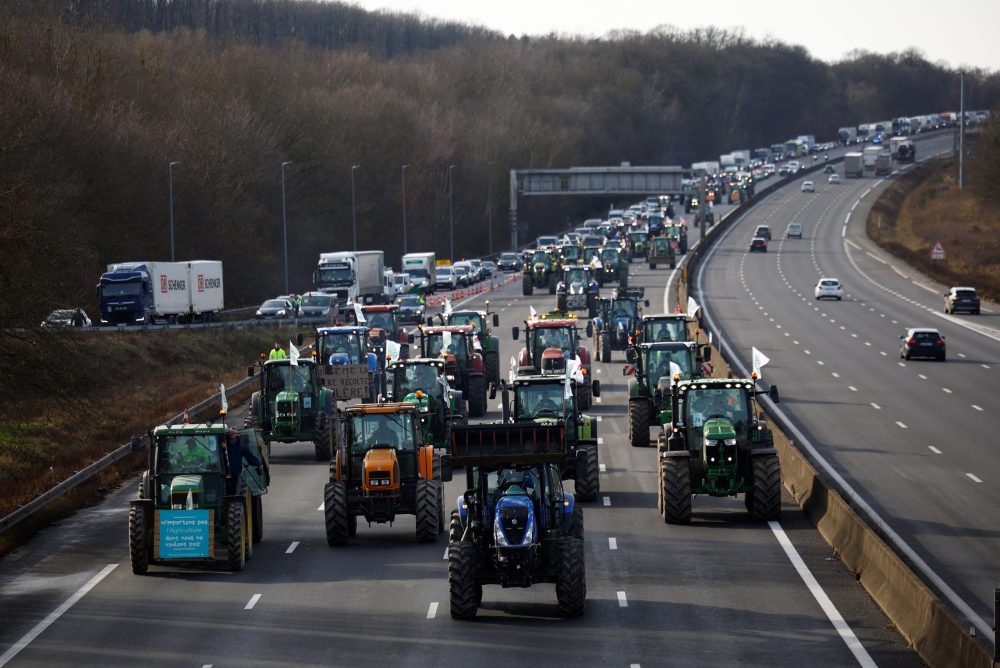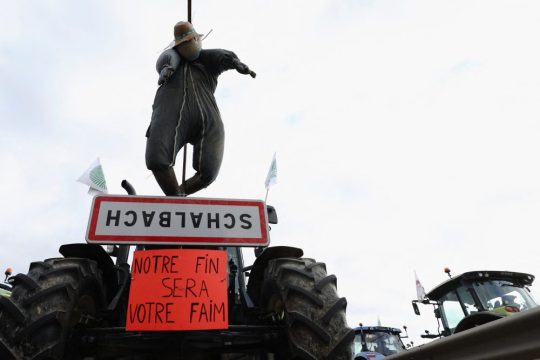Europe needs to ‘profoundly’ change its farming rules, says Macron

Brussels/Paris | Reuters — Europe’s farming sector is facing a major crisis and needs to ‘profoundly’ change its rules, French President Emmanuel Macron said in Brussels, reaffirming Paris is against striking the Mercosur free-trade agreement with Latin American countries.
“All we are asking for is that the environmental and hygiene rules we impose on our farmers and other professions be the same”, Macron said, adding: “As of today, as the draft texts stand, France opposes and will continue to oppose to this free-trade deal”.
Speaking after a European Union leaders’ summit in Brussels, which was overshadowed by hefty protests staged by farmers from all over the continent, Macron said the EU also needed a joint mechanism to guarantee fair prices retailers and food giants pay to producers.
Read Also
Canada pledges funds for efficient fertilizer research
Canada will join the U.S., U.K., and others in a group dedicated to advancing efficient and novel fertilizers, the federal government announced today.
At a separate news conference around an hour earlier, German Chancellor Olaf Scholz said he was a “big fan” of the Mercosur deal, which affects Argentina, Brazil, Paraguay and Uruguay and has been in the works for around 20 years.
Time to go home
Two of France’s main farming unions on Thursday urged protesters who have staged hundreds of tractor blockades across the country to go back home, after the government announced measures to try to quell the anger in a movement that has spread across Europe.
While some local grievances vary, the unrest, also seen in Belgium, Portugal, Greece and Germany, has exposed tensions over the impact on farming of the EU’s drive to tackle climate change, as well of opening the door to cheap Ukrainian imports to help Kyiv’s war effort.
Farmers’ complaints across Europe include being choked by green rules, taxes, rising costs and unfair competition from abroad.
The frustration came to a head in Brussels earlier in the day, where farmers threw eggs and stones at the European Parliament, and started fires and set off fireworks as they demanded EU leaders at the nearby summit nearby do more to help them.
“We want to stop these crazy laws that come every single day from the European Commission,” Jose Maria Castilla, a farmer representing the Spanish farmers’ union Asaja, said in Brussels.
With the call from some of the French unions, the question now is whether farmers will they lift their blockades in France – and what will happen to protests that have spread across Europe.
French pledges
The French farmers had stepped up their tractor protests from Monday after more than two weeks of demonstrations. Wary of further escalations, the government promised on Thursday to offer them more protection, including by better controlling imports and giving farmers extra aid.
“Everywhere in Europe the same question arises: how do we continue to produce more but better? How can we continue to tackle climate change? How can we avoid unfair competition from foreign countries?,” Prime Minister Gabriel Attal said, as he announced the new measures in Paris.
In response to the array of pledges, Arnaud Rousseau, of France’s main farmers union FNSEA said it was “time to go home” and lift the blockades.
Arnaud Gaillot of the Young Farmers’ union said the same. But both warned that other types of protests would continue – and that they would take back to the streets if the government did not follow on its promises.

EU leaders meet farmers
The protests across Europe come as the far right, for whom farmers represent a growing constituency, is seen making gains in June’s European Parliament elections.
In Brussels, European Commission chief Ursula von der Leyen and Belgium Prime Minister Alexander De Croo – who holds the EU’s rotating presidency – were set to meet the European farmers’ lobby COPA-COGECA after the summit of EU leaders.
Von der Leyen said the European Commission would work with Belgium on a proposal to reduce farmers’ administrative burdens.
“To the farmers that are outside. We see you and we hear you,” European Parliament President Roberta Metsola said.
Small groups had tried to tear down the barriers erected in front of the parliament – a few blocks from where the summit was taking place – but police fired tear gas and sprayed water at the farmers with hoses to push them back.
A statue on the square was damaged. Security personnel in riot gear stood guard behind barriers where the leaders were meeting at European Council headquarters.
The pockets of unrest diminished during the day and the tractors began leaving in the afternoon.
Farmers have already secured several measures, including the bloc’s executive Commission proposals to limit farm imports from Ukraine and loosen some environmental regulations on fallow lands, which several EU leaders welcomed as they arrived at the summit.
And Irish Prime Minister Leo Varadkar echoed French President Emmanuel Macron’s opposition to signing a trade deal with the Mercosur group of South American countries in its current form – another key demand for farmers. But German Chancellor Olaf Scholz reiterated his support for the deal.
Supply chain impacts
Farmers across Europe staged protests during the day.
In Portugal, farmers used tractors to block at least three roads linking their country to Spain.
Hundreds of Greek farmers with black flags – to symbolise what they say is the death of agriculture – drove their tractors across the centre of Greece’s second-biggest city Thessaloniki.
“No farmers, no food, no future” one banner read. One tractor was carrying a black coffin.
“We hope to shake them up (with our protest), we hope they are frightened and change the laws they have enacted,” farmer Vassilis Kanods said.
At a protest in Italy, a tractor carried a sign reading: “You are destroying our future.”
Meanwhile, one of Belgium’s biggest supermarket chains Colruyt said on Thursday three of its distribution centres were blocked by protesting farmers, leading to disruptions in its supply chain.
Belgian media reported that 1,400 trucks were stuck at the port of Zeebrugge, blocked by farmers.
In France, Eric Hemar, the head of a federation of transport and logistics employers, said delays had cost transport firms about 30% of their revenues over the past 10 days.
—Reporting for Reuters by Sudip Kar-Gupta, Johnny Cotton, Yves Herman, Kate Abnett, Phil Blenkinsop, Erol Dogrudogan, Petra Wischgoll, Julia Payne in Brussels, Geert De Clercq, Nicolas Delame, Elizabeth Pineau, Tassilo Hummel and Kate Etringer in Paris, Piotr Lipinski in Gdansk, Catarina Demony in Lisbon, Angeliki Koutantou and Lefteris Papadimas in Athens, Alexandros Avramidis in Thessaloniki, Charlotte van Campenhout in Amsterdam.
Source: Farmtario.com

